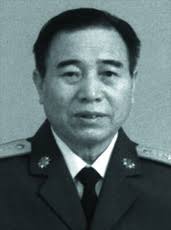Fu Kuiqing (Chinese: 傅奎清; 28 November 1920 – 28 August 2022) was a lieutenant general in the People's Liberation Army of China who served as political commissar of the Nanjing Military Region from 1985 to 1990. He was a delegate to the 5th National People's Congress and was a member of the Standing Committee of the 7th National People's Congress.[1] He was a representative of the 10th, 12th, and 13th National Congress of the Chinese Communist Party.[1] He was a member of the 12th Central Committee of the Chinese Communist Party.[1]
Fu Kuiqing | |||||||
|---|---|---|---|---|---|---|---|
傅奎清 | |||||||
 | |||||||
| Political Commissar of the Nanjing Military Region | |||||||
| In office June 1985 – April 1990 | |||||||
| Commander | Xiang Shouzhi | ||||||
| Preceded by | Guo Linxiang | ||||||
| Succeeded by | Shi Yuxiao | ||||||
| Personal details | |||||||
| Born | Fu Yixian 28 November 1920 Yingshan County, Hubei, China | ||||||
| Died | 28 August 2022 (aged 101) Nanjing, Jiangsu, China | ||||||
| Political party | Chinese Communist Party | ||||||
| Military service | |||||||
| Allegiance | |||||||
| Branch/service | |||||||
| Years of service | 1939–1998 | ||||||
| Rank | |||||||
| Battles/wars | Second Sino-Japanese War Chinese Civil War Korean War Counter-attack of Zhenbao Island | ||||||
| Awards | |||||||
| Chinese name | |||||||
| Chinese | 傅奎清 | ||||||
| |||||||
| Fu Yixian | |||||||
| Simplified Chinese | 傅义先 | ||||||
| Traditional Chinese | 傅義先 | ||||||
| |||||||
Biography edit
Fu was born Fu Yixian into a poor family in the town of Jinjiapu in Yingshan County, Hubei, on 28 November 1930.[2][1] He joined the Chinese Communist Party (CCP) in August 1938 and enlisted in the New Fourth Army one year later.[2][1] During the Second Sino-Japanese War, he served in the New Fourth Army and fought with the Imperial Japanese Army in east China's Anhui province.[2][3][1] In 1949, he was assigned to the 3rd Field Army of the People's Liberation Army, and engaged in the Menglianggu campaign, Battle of Laiyang, Huaihai campaign, and the Yangtze River Crossing campaign.[1]
After founding of the Communist State in 1949, he served in the 25th Army for a long time. He participated in the Korean War in April 1953 and returned to China in 1958.[2][3][1] He was made director of the Political Department of the 23rd Army in January 1964.[1] In February 1966, he became deputy political commissar, rising to political commissar in February 1969.[1] He was appointed vice governor and party secretary of Heilongjiang in August 1971, concurrently serving as deputy political commissar of the Shenyang Military Region since October 1975.[3][1] During his tenure, he participated in the Counter-attack of Zhenbao Island.[1] He also served as director of the Political Department from December 1977 to December 1980.[1] In December 1980, he was commissioned as political commissar and party secretary of the Fuzhou Military District, he remained in those positions until June 1985.[3][1] After the Fuzhou Military District was merged into the Nanjing Military Region in 1985, he was appointed political commissar and deputy party secretary of the military region.[2][3][1] He retired in July 1998.[1]
He attained the rank of lieutenant general (zhongjiang) in September 1988.[2]
On 28 August 2022, he died from an illness in Nanjing, Jiangsu, at the age of 102.[2][1]
References edit
- ^ a b c d e f g h i j k l m n o p q Bo Yunfeng (薄云峰) (2 September 2022). 抗战老战士、原南京军区政治委员傅奎清同志遗体告别仪式在宁举行. yzwb.net (in Chinese). Retrieved 3 September 2022.
- ^ a b c d e f g Zhou Xiaojing (周晓婧) (28 August 2022). 傅奎清逝世,享年102岁:第一次带队打鬼子就俘虏4名日军. sina (in Chinese). Retrieved 3 September 2022.
- ^ a b c d e 百岁将军:傅奎清的传奇人生. qq.com (in Chinese). 11 December 2021. Retrieved 3 September 2022.